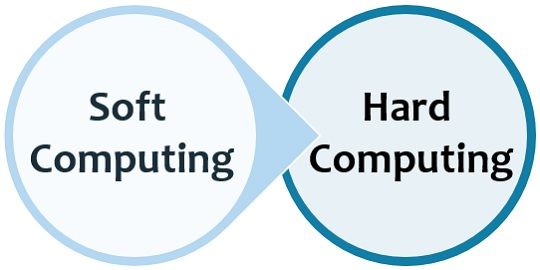Difference Between Soft Computing and Hard Computing

Soft computing and hard computing are two contrasting approaches in the field of computational intelligence, each with its own characteristics and applications.
Here are the key differences between soft computing and hard computing:
-
Precision vs. Approximation:
- Hard Computing: In hard computing, algorithms and models aim for precise and deterministic solutions. It relies on binary logic and mathematical rigor to provide exact answers.
- Soft Computing: Soft computing, on the other hand, embraces approximation and uncertainty. It is designed to work with incomplete or noisy information and provides solutions that are more flexible and tolerant of imprecision.
-
Certainty vs. Uncertainty:
- Hard Computing: Hard computing approaches, such as classical logic and traditional algorithms, assume that all information is certain and precise.
- Soft Computing: Soft computing acknowledges and deals with uncertainty, imprecision, and partial truth. It is well-suited for problems where the available information is incomplete or vague.
-
Binary vs. Fuzzy Logic:
- Hard Computing: Binary logic is a fundamental concept in hard computing. It relies on the principles of classical, crisp logic, where propositions are either true or false.
- Soft Computing: Soft computing incorporates fuzzy logic, which allows for the representation of partial truth or membership in a gradual, fuzzy manner. This is particularly useful in situations where boundaries between categories are not well-defined.
-
Rigidity vs. Adaptability:
- Hard Computing: Hard computing systems are typically rigid and do not easily adapt to changing conditions. They are designed for precise, fixed solutions.
- Soft Computing: Soft computing systems are more adaptable and resilient in dynamic or uncertain environments. They can learn and evolve based on experience and feedback.
-
Algorithmic vs. Heuristic:
- Hard Computing: Hard computing often relies on algorithmic solutions that follow strict rules and procedures.
- Soft Computing: Soft computing uses heuristic approaches, which are more like general strategies or guidelines. Heuristics allow for flexible problem-solving, especially in situations where there is no one-size-fits-all solution.
-
Applications:
- Hard Computing: Commonly used in tasks that require precise calculations, such as traditional control systems, mathematical optimization, and algorithmic problem-solving.
- Soft Computing: Applied in areas where dealing with uncertainty, imprecision, and approximation is crucial, such as pattern recognition, artificial intelligence, and decision support systems.
In summary, hard computing seeks precise and deterministic solutions using binary logic and traditional algorithms, while soft computing embraces approximation, uncertainty, and adaptability, often utilizing fuzzy logic and heuristic approaches. The choice between these approaches depends on the nature of the problem and the characteristics of the available data.
Thank you.
